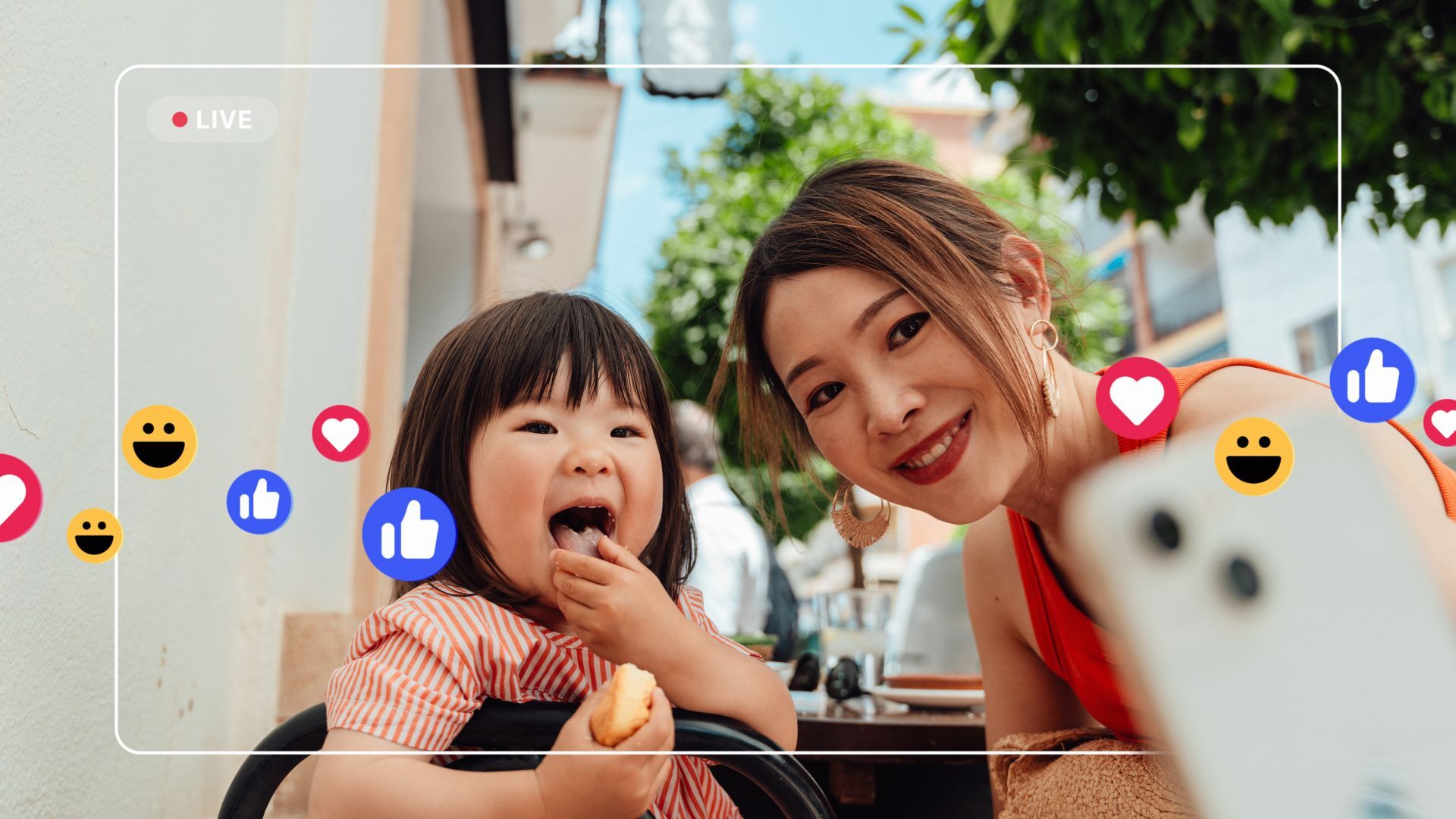Child influencers at risk as legislators look to regulate sharenting
As experts raise concerns over child labor and digital privacy rights, legislators look to regulate the child influencer industry.

Ruby Franke made headlines in February as the popular YouTuber, with over 2.3 million followers, was sentenced to four prison sentences spanning between one and 15 years each for aggravated child abuse. The 42-year-old mother of six from Utah in the US pleaded guilty to starving and abusing her children while profiting from sharing parenting advice on social media.
Despite Franke's case being an extreme example, it shed new light on the issues around digital child labor and children's privacy in the age of social media—and legislators are beginning to regulate.
Take a quick scroll through your feed and you'll see millions of parents giving up their children's privacy. Whether they're sharing updates of their lives, or trying to carve out a slice of an industry set to reach $24 billion by the end of 2024, more and more children are having their faces uploaded for the world to see.
Alongside Instagram foodies, YouTuber vloggers, and TikTok fashion influencers, there's a whole industry filled with viral happy families, first-time moms, dads, and solo kids making millions in marketing campaigns and brand partnerships.
That's where things get darker. A modern-day family business where, like for Franke's children, exploitation and abuse may lurk beneath the glamorous surface. After going unregulated for so long, those blurred digital lines are coming down, as legislators worldwide jump into action.
A legal framework
Italy is the latest country currently considering a law to safeguard children's images online and prevent parents from exploiting their kids for profits.
"Faced with the temptation to go viral, we must prioritize the privacy imperative," Serena Mazzini, an Italian social media strategist and long-time advocating against the exploitation of children's image online, said to the House of Representatives when the proposed law was first introduced—here is the full video in Italian.
Get instant access to breaking news, the hottest reviews, great deals and helpful tips.
The word sharenting, a portmanteau between sharing and parenting, indicates the activity of oversharing children's images online. Experts found around 81% of children living in Western countries have "some sort of online presence" before the age of 2—92% in the US and 73% in Europe to be more precise.
According to Mazzini, who helped write the draft bill, it's the parents' duty to protect their kids' rights to their image. But, governments must take immediate measures to contain such an increasingly invasive trend.
Social media experts, pediatricians, and privacy advocates have been investigating the consequences of what's known as sharenting and, even more so, the kid-influencing industry for over a decade. However, the law was largely silent for a long time.
Whether it's down to big cases resonating in the media, or for the first formerly sharented children now teens standing up against it, legislators are taking matters more seriously.
France introduced the first sharenting laws
France is the first country in the world to have passed legislation to both regulate the kid-influencing industry and everyday parents' sharenting practices.
The law, adopted by the Senate in June 2020, first introduced a legal framework to protect child influencers under 16 years old on social media. Among other things, parents are required to seek prior government authorization before their child can engage in these activities
Bruno Studer, the French MP behind the child influencers legislation, introduced another bill three years later to guarantee the respect of children's right to privacy on social media. The law was finally unanimously adopted last February.
"It is always easier not to publish content than to have it removed later. Instead of the temptation of virality, we must favor the imperative of intimacy," said Studer in an official announcement.
Teens are calling for regulations in America
Illinois made history in August last year after becoming the first US state to provide legal protection for children who feature in monetized online content. The one-of-a-kind law now forces parents to deposit a portion of these gross profits into a trust in the child's name.
Interestingly, it was 16-year-old Shreya Nallamothu who first drafted the bill after realizing how child influencers were left vulnerable by online marketing dynamics.
Chris McCarty from Washington is another teen advocating for a law to protect baby influencers' privacy. He started the site Quit Clicking Kids to spread awareness and push others to take action in their own states, too. Together with state Representative Emily Wicks, he drafted a bill that is currently passing through the House.
Plans for further proposals around child influencing and labor are also being considered in California, Pennsylvania, and Maryland.
Two proposals land in Italy's Parliament
Echoing the French legislation, Italy is also considering laws against sharenting, to protect children's privacy and safeguard baby influencers.
To be more precise, two proposals have landed in the Italian Parliament. One was signed by the coalition between Green Europe (Europa Verdi) and Italian Left (Sinistra Italiana), and the other was presented by the Five Star Movement Party (Movimento 5 Stelle).
The bills are at the beginning of their legislative process, and so much can change as they progress. Both, however, seek to regulate the child influencer industry by requiring parents to deposit any profits to a bank account in the child's name, which will be accessible to the child after they turn 18 years old.
The proposals also introduce the possibility of asking for "digital oblivion" after they turn 14, reverberating the GDPR's right to be forgotten already existing for adults.
Why do children make big money online?
After investigating over 100 accounts across Italy and Portugal, Serena Mazzini found a clear reason behind today's baby-infested digital world: content featuring children can obtain up to three times more interactions and views than those with only adults.
"A world where children become the main content for some parents to display for obtaining as many views as possible," said Mazzini, explaining that kids filled a social function to help accounts be perceived as more authentic.
All this results in more followers and interactions, ultimately increasing influencer accounts' commercial value. For most of them, it became a proper full-time job—a very lucrative one. A recent New York Times investigation revealed that a single child influencer's post can pay off up to $3,000.
There's a price to pay
While the quest to fully protect baby influencers—and more broadly every kid's image online—has just begun, what's certain is that the issue seems to have jumped among legislators' priorities.
After all, the boom of kid influencers is undeniable. It boosted the worldwide economy and gave families an alternative way to sustain themselves. However, the lack of legal frameworks has left this industry in danger for far too long.
While the laws get up-to-speed worldwide, parents must be aware of the impact on children's lives by having their childhood regularly broadcasted and transformed into a marketing ploy.
Remember: kids never asked for this—their face going viral for advertising campaigns, the fame, the money. In the Reddit post below the teen child of a popular mom blogger expressed how she feels "sick" of her mother insisting on profiting off her kids' images against their will.
AITA? My mom is an influencer. I am sick of being a part of it, I had "NO PHOTOS" hoodies printed for me and my little sister. from r/AmItheAsshole
Children's privacy and security are also at stake, with the risks getting even more serious and widespread as more kids are viral on social platforms. For instance, as a 2011 Carnegie Mellon CyLab study revealed, children are 51 times more likely to fall victim to identity theft online.
Something that we also too often forget, is that every time we post a video or photo on social media, we lose our exclusive ownership of it. This means that any other user can do anything they want with our content. This also leads to another big danger lurking in the kid-influencing industry: child sexual abuse.
The backlash against Wren Elanor, a mom and daughter TikTok account with over 17 million followers, flared up exactly as worried commentators realized the videos of Wren eating or having a bath were getting more likes and saves than other clips. Some followers even found Wren's content repurposed and sexualized elsewhere on the internet.
A recent New York Times investigation (see the video below) on 5,000 mom-run Instagram accounts of US girl influencers confirmed Wren's followers' concerns. Children's photos and videos make big money, but they draw men sexually attracted to them. Already in 2015, Australian researchers recorded that half of the material on pedophile sites appears to be sourced directly from social media.
@nytimes Seeking social media stardom for their underage daughters, mothers post images of them on Instagram. Although the site prohibits children under 13, parents can open so-called mom-run accounts for them, and they can live on even when the girls become teenagers. But what often starts as a parent’s effort to jump-start a child’s modeling career, or win favors from clothing brands, can quickly descend into a dark underworld dominated by adult men, many of whom openly admit on other platforms to being sexually attracted to children, an investigation by The New York Times found. Thousands of accounts examined by The Times offer disturbing insights into how social media is reshaping childhood, especially for girls, with direct parental encouragement and involvement. Some parents are the driving force behind the sale of photos, exclusive chat sessions and even the girls’ worn leotards and cheer outfits to mostly unknown followers. The most devoted customers spend thousands of dollars nurturing the underage relationships. Interacting with the men opens the door to abuse. Some flatter, bully and blackmail girls and their parents to get racier images. The Times monitored separate exchanges on Telegram, the messaging app, where men openly fantasize about sexually abusing the children they follow on Instagram and extol the platform for making the images so readily available. Meta, Instagram’s parent company, found that 500,000 child Instagram accounts had “inappropriate” interactions every day, according to an internal study in 2020 quoted in legal proceedings. In a statement to The Times, Andy Stone, a Meta spokesman, said that parents were responsible for the accounts and their content and could delete them anytime. Tap the link in our bio to read the full investigation. Video by Jennifer Valentino-DeVries, Michael Keller, Rebecca Suner, James Surdam
♬ original sound - The New York Times
The advent of easy-to-use AI-powered tools is now making it even easier to transform a kid's innocent image into over-sexualized deepfake content—and baby influencers are the first obvious prey.
On a mere psychological level, experts warn about the risk that teens, once reaching the legal age for having a digital presence (13 or 14, depending on the jurisdictions), will feel somehow caged in a representation they did not choose. This may even enlarge their chance of being the target of cyberbullies while growing up. It's not so difficult to foresee how this problem intensifies with popularity.
All in all, we should all remember that, sooner or later, the majority of Generation Alpha surely will have to come to terms with what their parents posted online during their childhood—whether or not that was part of an advertisement campaign. Is this the legacy we want to leave our kids?

Chiara is a multimedia journalist committed to covering stories to help promote the rights and denounce the abuses of the digital side of life – wherever cybersecurity, markets, and politics tangle up. She believes an open, uncensored, and private internet is a basic human need and wants to use her knowledge of VPNs to help readers take back control. She writes news, interviews, and analysis on data privacy, online censorship, digital rights, tech policies, and security software, with a special focus on VPNs, for TechRadar, TechRadar Pro, and Tom's Guide. Got a story, tip-off, or something tech-interesting to say? Reach out to chiara.castro@futurenet.com
 Club Benefits
Club Benefits





